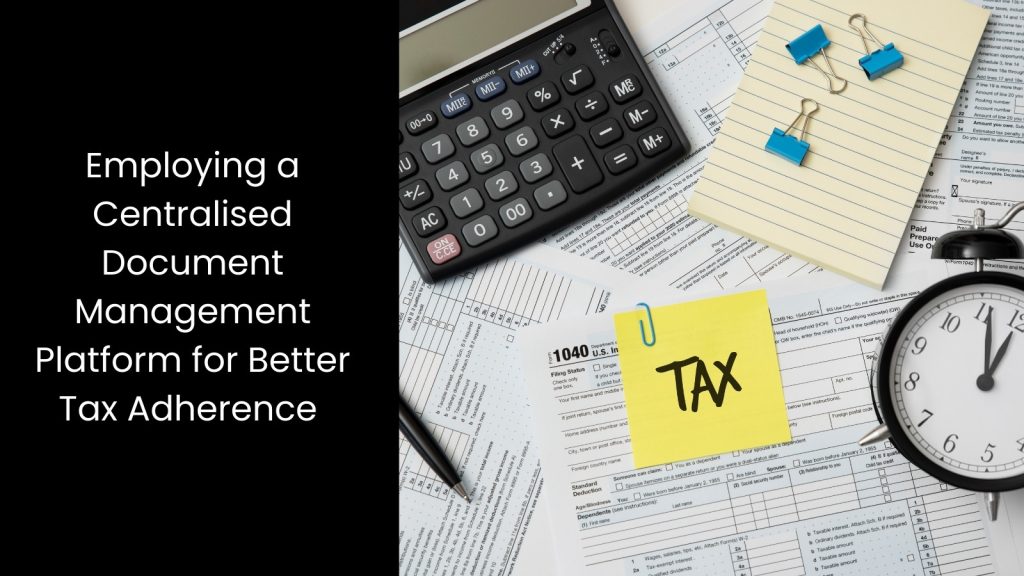Have you ever felt overwhelmed by the massive volume of paperwork required to file your taxes in Singapore? No matter if you are an individual or an entity, precise record-keeping is a major requirement during tax season. However, it would be tougher than you think to compile the necessary documents. This is where the concept of ‘Document Management’ catches your attention.
This article explores the benefits of implementing a robust document management platform to streamline your tax filing process in Singapore.
We will understand
Overview of the Corporate Tax Framework of Singapore

- Singapore’s corporate tax framework offers a compelling advantage for businesses due to its strategic location and favourable economic policies. The main reason for this ease is due to its position as a gateway between East and West, and Singapore provides businesses with access to the booming markets of Asia.
- According to the reports, the corporate tax system features a flat rate of 17%, ensuring simplicity and transparency. For new businesses, the start-up tax exemption scheme provides considerable relief by exempting a portion of taxable profits in their initial three years, which encourages entrepreneurship.
- Singapore has also adopted a single-tier tax system. This means the tax paid on income is the final tax, and dividends are not taxed again. It goes without saying that this policy contributes to a straightforward and attractive tax environment.
- Businesses in Singapore pay tax only on income derived from within the country, including trade profits, investment income, royalties, and other income. Singapore’s competitive edge includes over 80 double taxation avoidance agreements and multiple free trade agreements with countries like China, India, the EU, and the US, enhancing its appeal to international investors.
- If we go further on this, the city-state maintains its competitive position by keeping the corporate tax rate capped at 17% and offering various industry-specific tax incentives that can lower the effective tax rate. This comprehensive tax structure supports Singapore’s role as a key financial centre in the ASEAN region,
What is Document Management?

- As its name suggests, this is a system for organising, storing, and tracking electronic and physical documents. It helps businesses manage their files efficiently using several key features.
- If we look into its mechanism, document storage involves saving files in a secure digital repository, which protects them from unauthorised access. Then comes the document indexing. This indicates that it allows for easy retrieval by tagging documents with keywords and categories.
- Version control keeps track of changes made to documents, so users can access previous versions if needed. Document sharing and collaboration tools enable multiple users to work on the same file simultaneously, improving teamwork.
- It is a must to mention that the latter system also supports document retrieval, making it simple to find specific files quickly. One of the main aspects of this concept is document security. It ensures sensitive information remains protected through encryption and access controls. In one way, workflow automation streamlines processes by automating repetitive tasks, such as approval procedures. In another way, audit trails record who accessed or modified documents and when, providing a clear history for accountability.
Top 5 Benefits of Document Management for Taxing in Singapore

Better Data Integration
Data integration is highly important for managing tax documentation within an enterprise. Yes, it connects different data sources into a unified system. This integration allows for a seamless connection with accounting and financial systems, providing a comprehensive view of tax-related data.
If an enterprise processes without good data integration, it might face several issues. They could experience data inconsistencies where information from different sources does not match, leading to errors in tax calculations.
On one hand, those disconnected systems might also result in inefficient data retrieval, causing delays in preparing tax reports. On the other hand, without integration, maintaining compliance with tax regulations becomes challenging, increasing the risk of penalties.
This is where document management comes into play as a key role in improving data integration. They streamline the process by organising and storing documents in a centralised digital repository. This system tags and indexes documents, making it easier to access and integrate them with other financial data.
Document management systems also support version control, ensuring that the most up-to-date information is available. As they automate workflows, these systems reduce manual data entry errors and enhance accuracy. They also provide audit trails, which track changes and access to documents, aiding in compliance and transparency.
Simplified Audits
Audits are a vital fact when it comes to managing tax documentation. They ensure accuracy and compliance with tax regulations.
You know, an audit involves a thorough review of financial records and tax documents to verify that everything is correct and complies with the law. If a company fails to conduct audits accurately, it might face serious consequences.
In case of inaccurate audits can lead to errors in tax filings, which could result in financial penalties or legal issues. Companies might also struggle with identifying discrepancies or fraudulent activities, leading to financial losses.
But if a company goes with proper document management, it will greatly simplify audits for tax purposes. They make it easier to prepare for and manage tax audits by providing quick access to the required documents and records. These systems store documents under a centralised digital roof, allowing auditors to retrieve and review them efficiently.
Document management also includes features like indexing and tagging, which help in quickly locating specific records. As a part of it, version control ensures that auditors always see the most recent and relevant information. It is visible that document management fully supports audit trails, which track changes and access to documents, making it easier to trace the history of financial data.
Faster Processing
Speed is an essential fact when it comes to tax-related chores within a corporate environment. Do you agree?
One major way document management does this is by automating document retrieval and data extraction, which speeds up tax filing and processing. When document management is in place, it organises all tax-related documents in a centralised location, as we stated before. This system uses indexing and tagging to quickly locate and retrieve specific documents, reducing the time spent searching for paperwork.
The system can extract relevant data from these documents, eliminating the need for manual data entry, which speeds up the process and minimises errors. It also ensures that the most recent and accurate information is used, preventing delays caused by outdated data. We should not forget that this capacity backs up streamlining repetitive tasks, such as document approval and data entry, leading to quicker turnaround times.
Document management systems also offer easy access to financial records, which simplifies the preparation of tax reports and filings. This efficiency certainly allows companies to process their tax documentation faster, meet deadlines more effectively, and reduce the administrative burden on their staff.
Enhanced Accuracy
Accuracy is an important term that is interwoven with tax documentation.
It indeed helps enhance accuracy for tax purposes in a corporation by organising and controlling tax-related documents effectively. It reduces the likelihood of errors in tax filings by ensuring that all necessary documents are available and correctly processed.
With a document management system, all tax documents are stored on one platform. This system uses indexing and tagging to categorise documents as we described in the above sections, making it easy to locate and access the right files when needed. When proper document management is in place, it keeps track of changes to documents, ensuring that only the most up-to-date information is used.
Another fact is that the latter helps simplify tasks like data entry and document approval, reducing the chances of human mistakes. The system also supports data extraction, which pulls accurate information from documents for tax calculations. So yes, we can clearly see that document management ensures that all required documents are properly organised, up-to-date, and correctly processed. Not to mention that this greatly improves the accuracy of tax filings and reduces the risk of errors.
Efficient Record-Keeping
How can you prove yourself when tax issues arise if you do not have properly handled documents? This is why enterprises should put a lot of weight on this aspect.
Document management helps with efficient record-keeping for tax purposes in a corporation by providing a well-organised system for storing and managing documents. Centralised digital storage ensures all tax-related documents are organised and easily accessible, reducing the risk of misplaced or lost records.
With precisely handled documents, a corporation can keep all important tax files in one place, eliminating the need for physical storage and reducing clutter. As the system offers indexing and tagging to categorise documents, the latter makes it easier to search and find specific records quickly.
Another major benefit to consider is that its automated backup processes protect against data loss. This will ensure that tax documents remain secure and available even in case of unexpected events. Document management systems have the ability to track changes made to documents over time, so the most current information is always at hand.
Employing a Centralised Document Management Platform for Better Tax Adherence

It is a clear fact that a centralised document management platform is essential for better tax adherence, specifically in a business landscape like Singapore. If your enterprise has a powerful document management platform from a reputed brand that offers to consolidate and automate document handling, you can achieve greater accuracy, efficiency, and security in their tax processes, ultimately supporting smoother audits and compliance with tax regulations.

